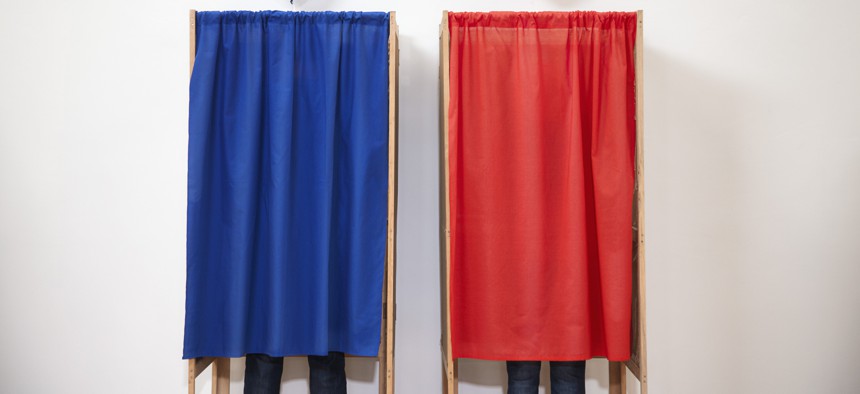Nearly 40% of Americans Are Tired of the Two-Party Political System

Hill Street Studios via Getty Images
The sentiment is even stronger among those 18 to 49 years old, with nearly half of people in that age group saying they wish they had alternatives to Democrats and Republicans.
As polarization between Democrats and Republicans increases, a large share of Americans is frustrated with the two-party political system, according to a recent report from Pew Research Center.
A survey conducted earlier this summer found that of the 6,174 participants, 39% said the statement, “I often wish there were more political parties to choose from in this country” described their views extremely or very well.
Young people are more likely to align with that sentiment: Nearly half of respondents between 18 and 49 said the statement described their views extremely or very well. A similar share of independents said the same.
Partisans are also interested in having more options. Of the survey takers who identified as Democrats, 38% said the statement describes their views extremely or very well, as did 21% of Republicans.
However, alternative parties don’t have a particularly strong track record in the United States–it’s been more than 50 years since a candidate outside the two parties won even a single state in a presidential election, the report said.
Hesitant to Choose a Party
When asked about why they choose not to fully identify with a party, many “leaners” said they are frustrated with the leadership of the party they lean toward. An increasing number of Democratic-leaning people feel this way, up from 28% in 2016 to 40% today. Inversely, 39% of Republican-leaners expressed frustration with leadership, down from just over half in 2016.
Independents are more likely to be inclined toward one party with the belief that the opposite party’s policies are harmful to the country, the report found. A majority of both Republican-leaning and Democrat-leaning voters–57% and 55%, respectively–cited opposition to the other party’s policies as a major reason why they lean the way they do.
And a growing number of Americans hold unfavorable views of both Democratic and Republican parties. Up from 6% in 1994, more than a quarter of respondents this year said they have negative views of the two parties, the report said. Nearly half of independents–both Republican- and Democratic-leaning–said the same.
Increased Polarization
About 60% of Republicans and just over half of Democrats surveyed expressed increasingly positive views of their parties, saying the members of their party are more moral than other Americans, the report said.
Meanwhile, 62% of Republicans and 54% of Democrats said they hold “very unfavorable” views of the other party. While this has been the case for the last few years, these levels of disdain are significantly higher than they were in 1994, when fewer than 25% of respondents viewed the opposite party so unfavorably.
For more information from the Pew Research Center report click here.
Molly Bolan is an assistant editor for Route Fifty.
NEXT STORY: Semiconductor Bill to Fund 20 Regional Technology Hubs






